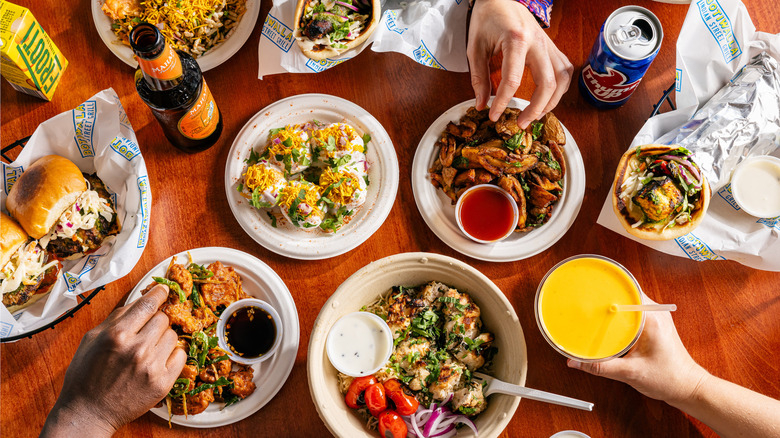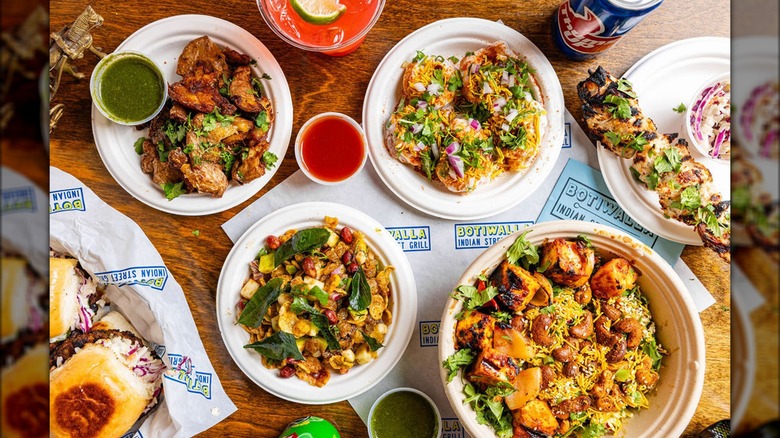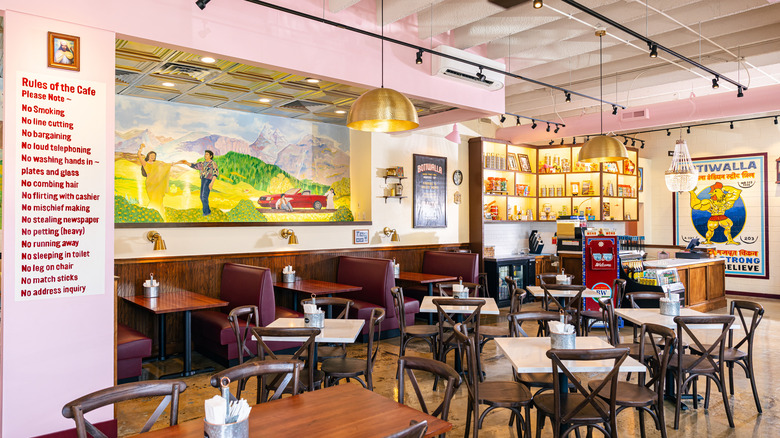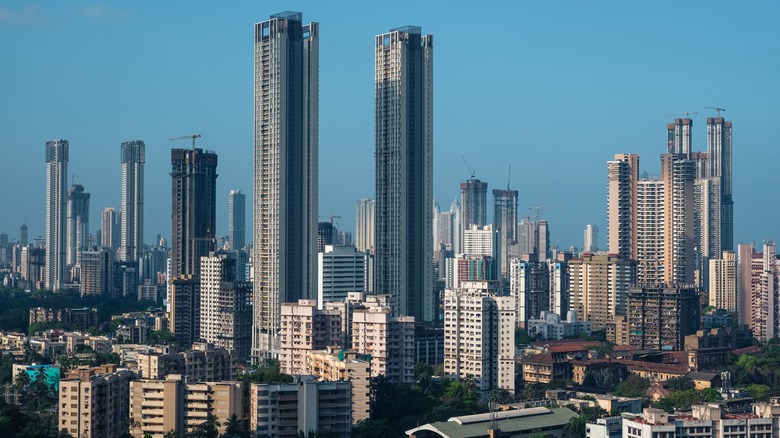What To Know About Irani Cafes, An Indian Culinary Tradition
With hanging family portraits, tasteful touches of gold plate in the decor, and a tongue-in-cheek list of dining rules, Asheville, North Carolina's Botiwalla pays homage to the tradition of Irani cafes: eateries that represent a hodgepodge of cultures, aesthetics, and foods. "Irani cafes are these strange and wonderful mash-ups of Victorian decor and Indian sensibilities," Meherwan Irani, the executive chef at Botiwalla, told Tasting Table.
Irani cafes first cropped up in India after Zoroastrian Irani immigrants came to the country — which was then under British occupation – in the 19th century. Once they settled in the area, they honed in on a niche in the food market to serve baked goods to the British. Their cafes began by offering English-style teas, wedding cakes, and pastries. They also adopted the classic aesthetic of English interiors, like heavy, dark wood furniture and marble countertops. Once the British left India, however, the cafes recalibrated to feed a predominantly Indian clientele. Irani explains on the Botiwalla website, "Even after the British left India, Irani cafes survived — adapting their menus to Indian taste and becoming some of the most iconic and revered dining institutions across the country." Just like their origins, the foods served by Irani cafes — not to mention the appearances they maintain — have remained equally unique.
Food -- and drink -- reflects the multi-layered origins of Irani cafes
Food may reflect culture, but culture also reflects food. In the case of Irani cafes, dishes and drinks evoke that combination of Indian, Irani, and 19th-century English culture. Across menus, you can find a variety of traditional Indian dishes, trays of tea for two with toast, as well as foods with more Parsi (those who came to India from Iran) beginnings.
Options range widely but may include the likes of rice dishes like berry pulao, grilled meats, and Parsi food like dhansak. Botiwalla draws a lot of inspiration from India's late-night street food scene. So, visitors to Asheville — as well as Charlotte and Atlanta (Botiwalla's other locations), can order the likes of skewered paneer and chicken, as well as various finger foods.
You can also find chai accompanied by bun maska, an Irani take on a fluffy roll — but don't expect the chai of your favorite coffee chain. For more British-inspired snacks, you can pair your chai with crumbly cookies like Parle G, British-style biscuits that are a top seller in India. Botiwalla also serves bread with butter and jams — a take on an English high tea. Given the distinct nature of all the food options, it's only fitting that Irani cafes create an ambiance that lives up to their diverse menus.
A colorful menu lends itself to an equally colorful -- and historic -- aesthetic
An Irani cafe may serve iterations of your favorite Indian dishes, but enter one for yourself for a dining experience that's entirely its own. A true mishmash of the varied cultures, with the spacious floorplan and open ceiling of American casual dining, the experience is distinct from a standard Indian eatery. But not entirely, as they still manage to nod to the tradition with family portraits on brightly colored walls, and murals that cleverly nod to 80s Indian pop culture.
Meherwan Irani designed Asheville's Botiwalla with each of these elements, which he remembers from cafes back in India. In the middle of his pale pink wall, he displays yet another element of tradition in the form of customer-directed guidelines. While Botiwalla's "rules" pay homage to Irani cafe tradition of standards of decorum (a sort of early version of no-shirt, no shoes, no service), they aren't today meant to be taken completely seriously. They, for instance, tell customers not to comb their hair, flirt with the cashier, sleep in the toilet, and so on ... not exactly necessary reminders for most diners. Yet, in keeping these on the wall, Botiwalla puts a fun and contemporary spin on the cafes of India's past — few of which still remain.
Few Irani cafes remain in Mumbai, but the tradition persists
Irani cafes were once a mainstay in India, particularly in Mumbai, but their legacy is fading quickly. In November 2022, The Indian Express reported that while the country's most populous city once had roughly 300 Irani cafes, fewer than 25 remained. There are several reasons that explain their decline, like stiff competition from chains and other restaurants that have since moved into the city, as well as disinterest from the children of the location's proprietors to carry on the business.
But the few that have endured have adapted by experimenting with new dishes, giving them a more modern take. But what one culture has tired of, another is ready to adopt, which is why the American Southeast is clamoring for more Botiwalla. So whether you're in Mumbai — or just in the mountains near Asheville — see how this combination of Indian, Irani, and British influences leaves its mark on this specific culinary experience. Just make sure to follow Botiwalla's rules — and don't make any mischief during your meal.



